分词与从句的转换
如何写出丰富生动的英语句子

如何写出丰富生动的英语句子福清三中何秀琼在高考英语写作题中,由于时间的限制,许多考生写出的句子显得过于单调、呆板。
其实,要想在有限的时间里写出丰富、生动的句子并不难。
考生只要对所学的英语句式加以巧妙转换,就一定能使写出来的句子更加准确、得体、简洁、灵活。
一、词与词之间的转换1. 形容词转换为名词This painting is very valuable.→This painting is of great value.2. 动词转换为名词Our hometown has changed a lot these years.→These years great changes have taken place in our hometown.二、词与从句的转换As he was tired and hungry, the boy was unwilling to move on.→Tired and hungry, the boy was unwilling to move on.三、非谓语动词与从句之间的转换1. 分词和从句的转换(1) 现在分词与从句的转换As he was lying in the grass, he thought of his parents living in the countryside.→Lying in the grass, he thought of his parents living in the countryside.(2) 过去分词与从句的转换Once it is seen, it will never be forgotten.→Once seen, it will never be forgotten.2. 不定式与从句的转换He spoke louder so that the audience could hear him clearly.→He spoke louder to let the audience hear him clearly.3.动名词和从句的转换On arriving ,he gave me an e-mail.As soon as he arrived , he gave me an e-mail.四、独立主格与从句的转换(1)If weather permits, we shall go there on foot.Weather permitting, we shall go there on foot.(逻辑主语+现在分词)(2)If everything is considered, his plan seems to be more workable. Everything taken into consideration, his plan seems to be more workable. (逻辑主语+过去分词)When this was done, we went home.This done, we went home.Given good luck, I will earn more money than all of you.Good luck given, I will earn more money than all of you.(3)Because there was nothing to do, we played games.There being nothing to do, we played games.(being 不可省略)五、句与句之间的转换1. 简单句与复合句的转换The girl is spoken highly of. Her composition was well written. →The girl whose composition was well written is spoken highly of.2. 一般句式与强调句的转换I graduated from the university last summer.→It was last summer that I graduated from the university.3. 条件句与祈使句的转换If you go through the gate, you will find the entrance to Bear Country.→Go through the gate, and you will find the entrance to Bear Country.六、其他形式的转换1.正常语序与倒装语序的转换Though I'm weak I will make the effort.→Weak as I am, I will make the effort.They will never give up the struggle for success.→Never will they give up the struggle for success.2.陈述语气与虚拟语气的转换The ship didn't sink with all on board because there were the efforts of the captain.→Without the efforts of the captain, the ship would have sunk with all on board.。
状语从句与分词作状语的转换
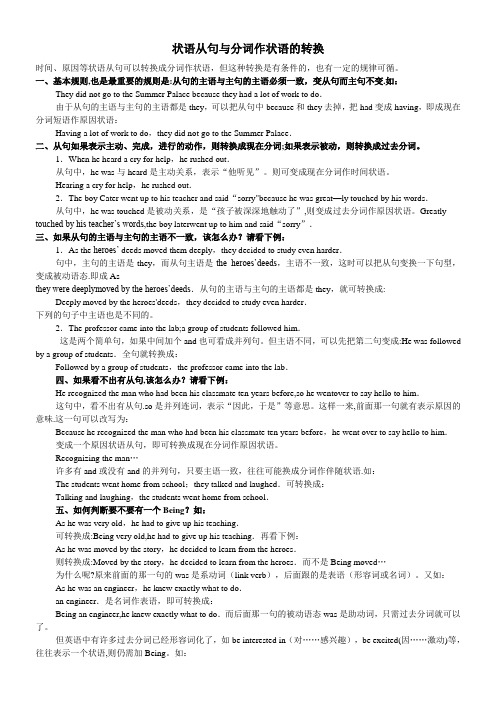
状语从句与分词作状语的转换时间、原因等状语从句可以转换成分词作状语,但这种转换是有条件的,也有一定的规律可循。
一、基本规则,也是最重要的规则是:从句的主语与主句的主语必须一致,变从句而主句不变.如:They did not go to the Summer Palace because they had a lot of work to do.由于从句的主语与主句的主语都是they,可以把从句中because和they去掉,把had变成having,即成现在分词短语作原因状语:Having a lot of work to do,they did not go to the Summer Palace.二、从句如果表示主动、完成,进行的动作,则转换成现在分词;如果表示被动,则转换成过去分词。
1.When he heard a cry for help,he rushed out.从句中,he was与heard是主动关系,表示“他听见”。
则可变成现在分词作时间状语。
Hearing a cry for help,he rushed out.2.The boy Cater went up to his teacher and said“sorry"because he was great—ly touched by his words.从句中,he was touched是被动关系,是“孩子被深深地触动了”,则变成过去分词作原因状语。
Greatly touched by his teacher’s words,the boy laterwent up to him and said“sorry”.三、如果从句的主语与主句的主语不一致,该怎么办?请看下例:1.As the heroes’ deeds moved them deeply,they decided to study even harder.句中,主句的主语是they,而从句主语是the heroes’deeds,主语不一致,这时可以把从句变换一下句型,变成被动语态.即成Asthey were deeplymoved by the heroes’deeds.从句的主语与主句的主语都是they,就可转换成: Deeply moved by the heroes'deeds,they decided to study even harder.下列的句子中主语也是不同的。
高考重难点语法-定语从句和分词短语的转化
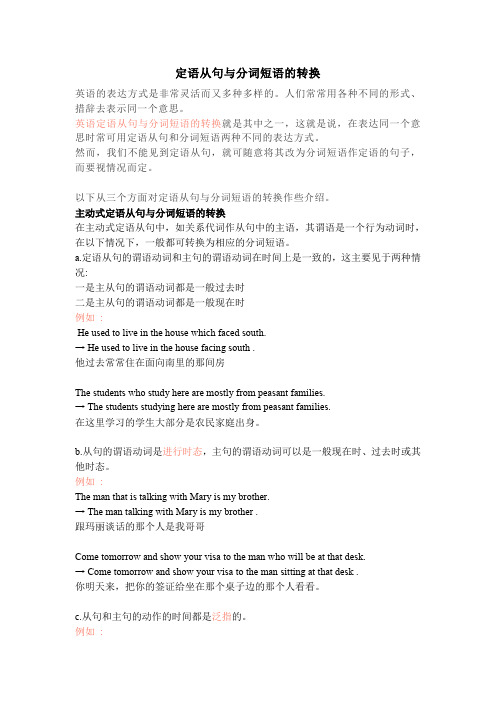
定语从句与分词短语的转换英语的表达方式是非常灵活而又多种多样的。
人们常常用各种不同的形式、措辞去表示同一个意思。
英语定语从句与分词短语的转换就是其中之一,这就是说,在表达同一个意思时常可用定语从句和分词短语两种不同的表达方式。
然而,我们不能见到定语从句,就可随意将其改为分词短语作定语的句子,而要视情况而定。
以下从三个方面对定语从句与分词短语的转换作些介绍。
主动式定语从句与分词短语的转换在主动式定语从句中,如关系代词作从句中的主语,其谓语是一个行为动词时,在以下情况下,一般都可转换为相应的分词短语。
a.定语从句的谓语动词和主句的谓语动词在时间上是一致的,这主要见于两种情况:一是主从句的谓语动词都是一般过去时二是主从句的谓语动词都是一般现在时例如:He used to live in the house which faced south.→ He used to live in the house facing south .他过去常常住在面向南里的那间房The students who study here are mostly from peasant families.→ The students studying here are mostly from peasant families.在这里学习的学生大部分是农民家庭出身。
b.从句的谓语动词是进行时态,主句的谓语动词可以是一般现在时、过去时或其他时态。
例如:The man that is talking with Mary is my brother.→ The man talkin g with Mary is my brother .跟玛丽谈话的那个人是我哥哥Come tomorrow and show your visa to the man who will be at that desk.→ Come tomorrow and show your visa to the man sitting at that desk .你明天来,把你的签证给坐在那个桌子边的那个人看看。
分词和定语从句的切换

1电在人们日常生活中得到广泛应用,因为它便于输送和转换为其它形式。
Electricity, which can be easily transmitted and changed into other forms of energy, has found wide application in daily life.Easily transmitted and changed into other forms of energy, Electricity has found wide application in our daily life.2因为在底特律可以筹集到建造机器所需的资金,所以Tom向妻子建议搬回底特律住。
Tom suggested to his wife that they move back to Detroit where he could get the necessary money to build his machine.Capable of raising fund for the construction of the machine in Detroit, Tom suggested to his wife that they move back there.3西方看到了几颗星星,小镇的灯光没能使它们暗淡。
H e could see a few stars to the west, where the lights of the town didn’t blur them out.Not blurred out by the lights of the town, stars could be seen to the west.4由于我们未能及时发货给你方造成了不便,我方表示歉意。
We apologize for the inconvenience on you that has been caused by our delay in delivery. Causing you inconvenience for the late delivery, we apologize for it.5他似乎不愿再和史密斯太太讲话,因为她现在异常无礼,令人厌烦。
分词做定语和状语与定语从句和状语从句的转换12 1

• 分词短语作定语与定语从句之间的转换 • 分词短语作状语与状语从句之间的转换
分词短语作定语与定语从句 之间的转换
• The meeting held last week is very important. • =The meeting which was held last week is very important. • 过去分词短语作定语,表被动
• Tell the boy playing there not to make loud noise. • =Tell the boy who is playing there not to make loud noise。 • 现在分词短语作定语,表主动且动作正在进行.
• 练习题:32E 1,4,6,9,12
• 主语+think/find/consider+it(形式宾语)+不 定式/宾语从句(真正宾语)
It的其他结构
• It seems that John is not coming er all.
• =John doesn’t seem to be coming after all.
• It seems +表语从句 • =表语从句主语+seem+不定式做表语
• The house standing on the corner of the street was built in 1955.
• =The house which stands on the corner of the street was built in 1955
• 现在分词短语作定语,表主动
11 醉翁亭记
1.反复朗读并背诵课文,培养文言语感。
现在分词与定语从句转换-推荐下载

(2) 形容词 + 介词 +doing sth Be busy in doing ; be occupied in; be interested in ; be responsible for doing sth..
(3) 主语+ have + fun\ pleasure \a good time\ trouble \ difficulty \ problem in doing sth ;have no hesitation in doing sth
occupied in doing sth;
(2)Sth need \ require\ want doing
(3) allow\ permit\forbid\advice doing sth
(4) 练习
<a> The light in the office is still on. He forgot
Can’t
stand doing sth; devote to doing sth; look forward to doing sth, stick to doing sth;
be
used to doing sth,
object to doing sth; be busy in doing sth; adapt to doing sth; be
动名词和现在分词的用法
Doing (1)
【内容】
(1) 动名词和现在分词
(2) 现在分词与过去分词对比应用:状语, 表语, 伴随或方式, 原因,条件,让步等
(3) 现在分词作定语时与定于从句之间的转化。
(4) 现在分词作状语与状语从句的转化。
一. 动名词:
状语从句和分词作状语的转换

状语从句与分词作状语的转换时间、原因等状语从句可以转换成分词作状语,但这种转换是有条件的,也有一定的规律可循。
一、基本规则,也是最重要的规则是:从句的主语与主句的主语必须一致,变从句而主句不变。
如:They did not go to the Summer Palace because they had a lot of work to do.由于从句的主语与主句的主语都是they,可以把从句中because和they去掉,把had变成having,即成现在分词短语作原因状语:Having a lot of work to do,they did not go to the Summer Palace.二、从句如果表示主动、完成,进行的动作,则转换成现在分词;如果表示被动,则转换成过去分词。
1.When he heard a cry for help,he rushed out.从句中,he was与heard是主动关系,表示“他听见”。
则可变成现在分词作时间状语。
Hearing a cry for help,he rushed out.2.The boy Cater went up to his teacher and said“sorry”because he was great-ly touched by his words.从句中,he was touched是被动关系,是“孩子被深深地触动了”,则变成过去分词作原因状语。
Greatly touched by his teacher's words,the boy laterwent up to him and said“sorry”.三、如果从句的主语与主句的主语不一致,该怎么办?请看下例:1.As the heroes' deeds moved them deeply,they decided to study even harder.句中,主句的主语是they,而从句主语是the heroes'deeds,主语不一致,这时可以把从句变换一下句型,变成被动语态。
过去分词作状语
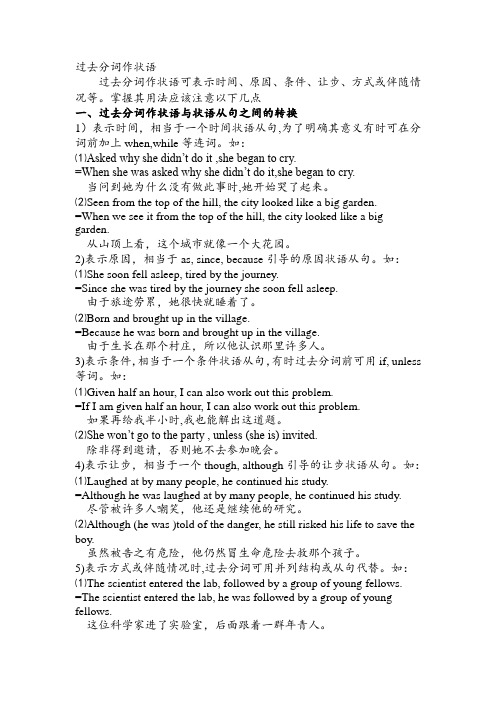
过去分词作状语过去分词作状语可表示时间、原因、条件、让步、方式或伴随情况等。
掌握其用法应该注意以下几点一、过去分词作状语与状语从句之间的转换1)表示时间,相当于一个时间状语从句,为了明确其意义有时可在分词前加上when,while等连词。
如:⑴Asked why she didn’t do it ,she began to cry.=When she was asked why she didn’t do it,she began to cry.当问到她为什么没有做此事时,她开始哭了起来。
⑵Seen from the top of the hill, the city looked like a big garden.=When we see it from the top of the hill, the city looked like a big garden.从山顶上看,这个城市就像一个大花园。
2)表示原因,相当于as, since, because引导的原因状语从句。
如:⑴She soon fell asleep, tired by the journey.=Since she was tired by the journey she soon fell asleep.由于旅途劳累,她很快就睡着了。
⑵Born and brought up in the village.=Because he was born and brought up in the village.由于生长在那个村庄,所以他认识那里许多人。
3)表示条件,相当于一个条件状语从句,有时过去分词前可用if, unless 等词。
如:⑴Given half an hour, I can also work out this problem.=If I am given half an hour, I can also work out this problem.如果再给我半小时,我也能解出这道题。
德语专业四级,四级中句型转换重点

德语专业四级,四级中句型转换重点德语句型转换的策略与方法句型转换是德语语法研究中一个重要的项目。
在国内外的一些德语考试中,如各德国高校的DSH考试与XXX德语六级考试,语法部分的考试题型主要就是句型转换,即把给出的句子通过语法手段进行改写,而不改变原句的意思。
同时,这种句型转换的能力在实际德语应用中确实也非常重要,特别是在阅读中遇上的长句和难句都可以通过句型的转换来简化以达到准确理解的目的。
这也是那些考试要考察考生句型转换能力的原因。
本文的目的不在于讲解复杂语法原理,而是展示一些基本的转换方法,使读者能尽快掌握各种句型转换的技能。
一、主动语态被动语态主动语态与被动语态之间的相互转换,是最基本的句型转换形式之一。
将主动句转换为被动句的方法:1.在主动句中寻找受及物动词支配的第四格(名词或代词),找到后将其改写为第一格,作为被动句中的主语。
若主动句动词不支配第四格,则被动句的主语用es。
2.将主动句的动词按人称和时态改成werden+第二分词的形式。
注意,如果句子是现在完成时和过去完成时,则最后应是XXX,而不是geworden。
3.主动句的主语在被动句中用介词von或durch带出,一般说来人用von,而物用durch。
如果是man的话则把man去掉。
4.在助动词和分词中间按原样写上主动句的其他成分。
5.注意在第一点中提到的es只能出现在句首,一般可把句子的其他成分放在句首并省略这个es。
6.若主动句中有情态动词的话,则保留情态动词,但要注意人称的变化。
句子的结构是:情态动词+。
+分词+werden.例如:XXX。
转换为 Das Zimmer ist XXX von XXXMan muss am XXX。
转换为 Es muss am XXX.XXX如果要将被动句转换为主动句,需要找到被动句中由von或者durch引出的动作的执行者,并以此作为主动句的主语。
如果被动句中没有这个部分,则主动句主语用man。
原因状语从句及状语从句变分词短语

原因状语从句一、简述:原因状语从句是状语从句中较为简单的一种,是用于解释事件发生原因的状语从句。
原因状语从句常见的引导词有because、since、as、for等。
它们之间有微妙的区别。
二、比较:引导词because, since,as和for的区别:1)because从句放于句首时要用逗号分开,放在句末时,可不用逗号分开。
because表示直接原因,语气最强,最适合回答why引导的疑问句。
because of也表示原因,但它后面不接从句, 只能接名词, 代词或动名词。
注意:because 和so 不可同时出现在一个句子里。
I do it because I like it. = I like it so I do it. We went by bus because it was cheaper. = It was cheaper so we went by bus.He can't go to school because of his illness.2) since引导的原因状语从句一般放于主句之前表示已知的、显然的理由(通常被翻译成"既然"= now that ),较为正式,语气比because弱。
Since you are free today, you had better help me with my mathematics.Now (that) you are grown up, you should not rely on your parents.3) as 引导原因状语从句时表示附带说明的"双方已知的原因",含有对比说明的意味,语气比since弱,较为正式,位置较为灵活(常放于主句之前)。
As it is raining, you'd better take a taxi.I went to bed early, as I was exhausted.4)for引导的是并列句表示原因但并不说明主句行为发生的直接原因,只提供一些辅助性的补充说明,for引导的并列句只能放于主句之后并且必须用逗号将其与主句隔开。
非谓语动词与从句的转换

非谓语动词与从句的转换编辑整理:尊敬的读者朋友们:这里是精品文档编辑中心,本文档内容是由我和我的同事精心编辑整理后发布的,发布之前我们对文中内容进行仔细校对,但是难免会有疏漏的地方,但是任然希望(非谓语动词与从句的转换)的内容能够给您的工作和学习带来便利。
同时也真诚的希望收到您的建议和反馈,这将是我们进步的源泉,前进的动力。
本文可编辑可修改,如果觉得对您有帮助请收藏以便随时查阅,最后祝您生活愉快业绩进步,以下为非谓语动词与从句的转换的全部内容。
知识讲解知识点1:不定式(短语)与从句的关系1。
【考查点】:不定式(短语)在句中作主语,其功能相当于一个主语从句,因此二者之间可以转换。
(1)。
To be able to help you is really an honor.(=That I’m able to help you)(2)。
He seemed to know the way.(=It seemed that he knew the way.)(3).Bush is said to have decided to attack North Korea.(= It is said that Bush has decided to attack North Korea.)2.【考查点】:不定式(短语)在句中作宾语或宾补,相当于一个宾语从句(1).We still don’t know when and where to build a school.(宾语) (=when and where we should build a school)(2).I advised him to go and see the doctor.(宾补)(=that he should go and see)(3)。
He thought it a great pity not to have invited her. 。
定语从句的引导词及句式转换

定语从句的引导词及句式转换定语从句是英语语法中一个重要的句子结构,用于修饰名词或代词。
在句子中,定语从句通常由引导词引导,可以用不同的句式进行转换。
下面将介绍定语从句的引导词及句式转换。
一、引导词:1. 关系代词:关系代词在定语从句中可以作为主语、宾语或介词的宾语。
常见的关系代词有:who, whom, whose, which, that。
例句1:The person who is talking to my teacher is my father.(主语)例句2:The book which I borrowed from the library is very interesting.(宾语)例句3:This is the girl whose brother is a famous actor.(介词的宾语)2. 关系副词:关系副词在定语从句中一般作状语,修饰整个句子。
常见的关系副词有:where, when, why。
例句1:I will never forget the day when we met for the first time.(修饰时间状语从句)例句2:I still remember the place where we spent our summer vacation.(修饰地点状语从句)例句3:That is the reason why I didn't go to the party.(修饰原因状语从句)二、句式转换:1. 将定语从句转换为非限制性定语从句:非限制性定语从句用来对名词或代词进行额外说明,用逗号将其与主句分开。
例句(限制性定语从句):The woman who is sitting next to me is my mother.例句(非限制性定语从句):The woman, who is sitting next to me, is my mother.2. 将定语从句转换为分词短语:分词短语作为定语从句的转换形式,修饰名词或代词。
2024年高一英语现在分词短语转定语从句练习题30题

2024年高一英语现在分词短语转定语从句单选题30题1.The students playing basketball on the playground are from Class One.A.who play basketballB.that play basketballC.which play basketballD.whose play basketball答案:A。
现在分词短语“playing basketball on the playground”修饰students,表示正在操场上打篮球的学生。
定语从句“who play basketball on the playground”也修饰students,who 在定语从句中作主语,指人。
B 选项that 一般不用于指人。
C 选项which 用于指物。
D 选项whose 表示所属关系,不符合题意。
2.The girl singing a song in the classroom is very beautiful.A.who sings a songB.that sings a songC.which sings a songD.whose sings a song答案:A。
现在分词短语“singing a song in the classroom”修饰girl,表示在教室里唱歌的女孩。
定语从句“who sings a song in the classroom”也修饰girl,who 在定语从句中作主语,指人。
B 选项that 一般不用于指人。
C 选项which 用于指物。
D 选项whose 表示所属关系,不符合题意。
3.The books lying on the desk are mine.A.which lie on the deskB.that lie on the deskC.who lie on the deskD.whose lie on the desk答案:A。
现在分词与定语从句转换

Doing (1)【内容】(1)动名词和现在分词(2)现在分词与过去分词对比应用:状语,表语,伴随或方式,原因,条件,让步等(3)现在分词作定语时与定于从句之间的转化。
(4)现在分词作状语与状语从句的转化。
一.动名词:【定义】相当于名词,在句中作主语;宾语;表语。
【构成形式】主动:doing sth 被动:being doneHaving done having been done.【应用】1.做主语。
(1)当动词短语或动词位于句首时做主语。
被看作单数不可数名词。
主语较长时用it代替主语。
(2) 特殊句型。
It is no use doing sthIt is useless doing sthIt is no good doing sthIt is a waste of time doing sthIt is worthwhile doing sthThere is no point\ use in doing sthThere is nothing wore than doing sth 没什么比做…更糟糕的。
(3) 练习一下。
<a> 听到这个坏消息使他哭了起来。
<b> 开快车是非常危险的。
<c> 已经错过了早班车已经使她很担忧。
<d> 看那本书是浪费时间。
2.作动词宾语。
(1)Forbid doing sth; allow doing sth ,advocate doing sth ; admit doing sth ; Advise\ suggest doing sth; risk doing sth; appreciate doing sth; enjoy doing sth; Envy doing sth; avoid doing sth; consider doing sth; delay doing sth; deny doing sth. Dislike doing sth; escape doing sth; excuse doing sth; finish doing sth; forgive doing sth. Understand doing sth; give up doing sth; imagine doing sth; keep doing sth; mind doing sth. Miss doing sth , practice doing sth, put off doing sth, resist doing sth; can’t help doing sth; Can’t stand doing sth; devote to doing sth; look forward to doing sth, stick to doing sth; be used to doing sth, object to doing sth; be busy in doing sth; adapt to doing sth; be occupied in doing sth;(2)Sth need \ require\ want doing(3) allow\ permit\forbid\advice doing sth(4) 练习<a> The light in the office is still on. He forgot (turn) it off.<b> Don’t you remember (see)the man before?<c> I can’t bear (laugh).<d> you will forbid (photograph) in the park.= you will in the park.<e> Your composition needs (correct) .= Your composition needs .做介词宾语(1) 动词+ 介词+ doing sthBe used to doing ; be related to doing; get down to doing ; be given to doing =be addicted to doing ; put one’s mind to doing ; give rise to (引起); be equal to doing sth ; devote one’s to doing sth ; lead to doing sth; object to doing ; look forward to doing sth; be opposed to doing sth ; stop\ keep\ prevent sb from doingh sth; protect sb from doing sth; forbid sb from doing sth; Remind sb of doing sth ; Warn sb of doing sth ; Rob sb of doing sth; inform sb of doing sth ; accuse sb of doing sth ; feel like doing sth.(2) 形容词+ 介词+doing sthBe busy in doing ; be occupied in; be interested in ; be responsible for doing sth..(3) 主语+ have + fun\ pleasure \a good time\ trouble \ difficulty \ problem in doing sth;have no hesitation in doing sth(4) what\ how about doing sth (征求意见)(5)go + shopping\ swimming\ camping\ climbing\hiking\ running\skating\ walking\ sightseeing\dancing\ fishing\ riding\ jogging\ hunting\ driving\ boating ……练习<a> I used to (get) up late , but now I am used to (get) up early.<b> The rain prevented us from (go) out .<c> She objects to (marry) me.<d> 你对打篮球感兴趣吗?<e> 我读懂他有困难。
定语从句和分词短语做定语的区别
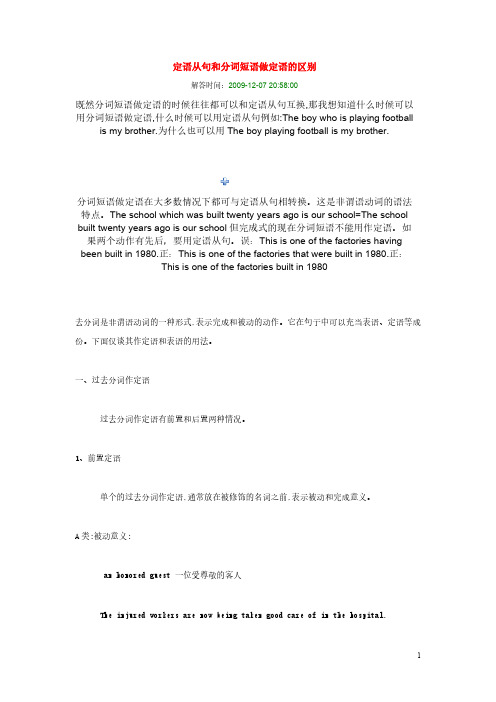
定语从句和分词短语做定语的区别解答时间:2009-12-07 20:58:00既然分词短语做定语的时候往往都可以和定语从句互换,那我想知道什么时候可以用分词短语做定语,什么时候可以用定语从句例如:The boy who is playing football is my brother.为什么也可以用The boy playing football is my brother.分词短语做定语在大多数情况下都可与定语从句相转换。
这是非谓语动词的语法特点。
The school which was built twenty years ago is our school=The school built twenty years ago is our school但完成式的现在分词短语不能用作定语。
如果两个动作有先后,要用定语从句。
误:This is one of the factories having been built in 1980.正:This is one of the factories that were built in 1980.正:This is one of the factories built in 1980去分词是非谓语动词的一种形式,表示完成和被动的动作。
它在句子中可以充当表语、定语等成份。
下面仅谈其作定语和表语的用法。
一、过去分词作定语过去分词作定语有前置和后置两种情况。
1、前置定语单个的过去分词作定语,通常放在被修饰的名词之前,表示被动和完成意义。
A类:被动意义:an honored guest 一位受尊敬的客人The injured workers are now being taken good care of in the hospital.受伤的工人现正在医院受到良好的照料。
B类:完成意义:a retired teacher 一位退休的教师They are cleaning the fallen leaves in the yard.他们正在打扫院子里的落叶。
定语从句与分词短语的转换
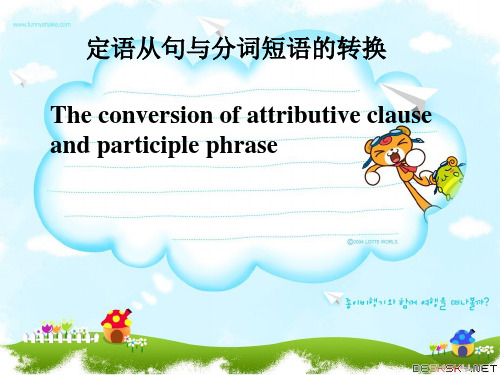
定语从句转换成现在分词短语做后置定语, 有主动或进行的意思。先行词与现在分词
有主动关系
• The boys who are playing tennis are my friends. • The boys playing tennis are my friends. • I know the boy who is running in the park. • I know the boy running in the park
用定语从句完成下列句子.
The man standing under under 1. The man is my brother. He is standing The man who is standing the tree under the tree. _____________________. is my brother the tree is my brother.
Fill in the blanks with proper participles
• 1. The scientist _________ us a talk just now is giving from Tsinghua University. (give) • 2. The teacher followed by her students came ________ in. (follow) singing • 3. The girl ________ for us at the party is Tom’s sister. • (sing) performed • 4. The play ___________ last night was written by Shakespeare. (perform) shown • 5. I love the movie ________ on TV last night. (show)
- 1、下载文档前请自行甄别文档内容的完整性,平台不提供额外的编辑、内容补充、找答案等附加服务。
- 2、"仅部分预览"的文档,不可在线预览部分如存在完整性等问题,可反馈申请退款(可完整预览的文档不适用该条件!)。
- 3、如文档侵犯您的权益,请联系客服反馈,我们会尽快为您处理(人工客服工作时间:9:00-18:30)。
分词的形式:(not ) doing现在分词的一般式(主动、进行)(not ) done过去分词的一般式(被动、完成)(not ) being done分词的进行被动式(被动、进行)(not ) having done分词的完成式(主动、完成)谓语与分词非谓语转换的一般原则do/does/didis/are doingwas/were doing--- doingis/are/was/were done--- doneis being done--- being donehas/have done--- having donehas/have been done--- (having been) done分词与从句的转换1 分词作定语,相当于定语从句1) The hospital was an oldbuilding that/which was built in 1931.--- The hospital was an old building built in 1931.2) Do you know the girl whois standing over there?--- Do you know the girl standing over there?3) The man who spoke to usthe other day has gone toLondon.--- The man speaking to us the other day has gone toLondon.4) He became inspired when he thought about helping ordinary people who were exposed to cholera.--- He became inspired when he thought about helping ordinary people exposed to cholera.5) He found that it came from the river which was polluted by the dirty water.--- He found that it came from the river pollutedby the dirty water.6) He immediately told the people in Broad Street who were astonished to remove the handle from the pump.--- He immediately told the astonished people inBroad Street to removethe handle from thepump.7) He found supporting evidence from two other deaths that were linked to the Broad Street outbreak.--- He found supporting evidence from two otherdeaths linked to the Broad Street outbreak.8) The building which is being built is a new hospital.--- The building being built is a new hospital.2.分词作状语,相当于状语从句:1) While I was waiting for thebus, I caught sight of her.--- (While)waiting for the bus, I caught sight of her.2) As he was educated by theparty, he became a great fighter.--- Educated by the party,he became a greatfighter.3) Because I hadn’t receivedan answer, I wrote to him again.--- Not having received an answer, I wrote to himagain.4) If we had been givenenough time, we could have done it better.--- If (having been) givenenough time, we couldhave done it better5) Though he had made greatachievements, he didn’t pride.--- Though having made great achievements, hedidn’t pride.2.分词作状语,相当于并列句或可以与with转换:1) He died, and left hisdaughter much money.--- He died, leaving his daughter much money.2) The teacher entered theclassroom, followed by his students.--- The teacher entered the classroom and hisstudents followed him.The teacher entered theclassroom and he wasfollowed by his studentsThe teacher entered theclassroom with hisstudents following him.3. 独立主格作状语,相当于状语从句journey.--- The shower being over,we continued ourjourney.disappointed.--- All the tickets (havingbeen) sold out,they wentaway disappointed.4. 分词做表语或宾补1) He got interested in the two theories explaining how cholera killed people.2) He became inspired when he thought about helping ordinary people.3) He was frightened and his mind was confused.4) He found that the windowswere broken.--- He found the windowsbroken.5) I found that my heart wasbeating fast at the newsof bomb explosion.--- I found my heartbeating fast at the newsof bomb explosion.练习:1. A man was arrested by the police. What was his name? (合并成简单句)--- What was the name of the man arrested by the police?2.There is a young woman who is dressed in green. (改成简单句)--- There is a young woman dressed in green.3.The concert which was given by the band was a great success. (改成简单句)--- The concert given by the band was a great success.4.What’s the language spoken in that area? (改成复合句)--- What’s the language which/ that is spoken in that area?5.We’ve already reached the target set in the program. (改成复合句)--- We’ve already reached the target that / which was set in the program.6.站在门口的那个人是我的爸爸。
(用分词和从句两种形式翻译)The man standing by thedoor is my father.The man who is standing by the door is my father.7.The pen lying on the table belongs to you. (改成复合句)--- The pen which is lying on the table belongs to you.8.The boy making faces is my son. (改成复合句)--- The boy who is making faces is my son.9.I like songs which were sung by Liuhuan. (改成简单句)--- I like songs sung by Liuhuan.10. I found that he waswaiting for a bus at thestation.(改成简单句)--- I found him waiting for abus at the station.12. If all things areconsidered, her paper isbetter than yours. (改成简单句)--- All things considered, her paper is better thanyours.Her paper is better thanyours with all thingsconsidered.13. As mum is ill in bed,I cannot go to school.(改成简单句)--- Mum being ill in bed,Ican't go to school.14. He went away and not aword was spoken.(改成简单句)--- He went away withouta word spoken.He went away without speaking a word.1.called2.calling3.considered4.Consideringparedparing7.Faced8.Facing9.seated10.sitting11.Having waited12.waiting13.to have studied14.to be studying15.to study16.Having finished17.being held18.to be held19.held20.Being ignored21.Being exposed22.Exposing23.absorbed24.was absorbed25.finished26.had been finished/was finished27.being28.were29.to attend30.attend31.working32.dragging33.attended34.type35.(in) bringinge37.to come38.talking39.talking40.mentioned41.mentioned42.Exposed43.Exposing44.Expose45.Exposing46.Being exposed47.To make48.Getting49.Listening50.Listening。
